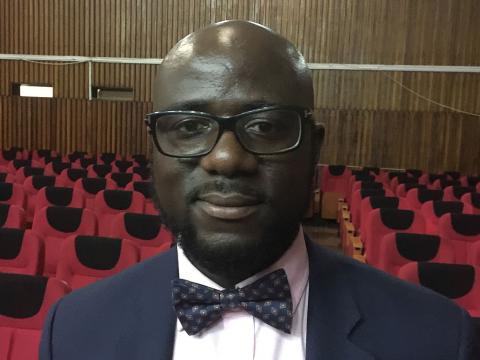By Kemo Cham
Sierra Leone’s Anti Corruption Commission (ACC) has deployed a hi-tech tool designed to let citizens report corruption with more ease and autonomy.
With an internet connected devise, anyone anywhere can download a specially dedicated and interactive app and report corruption, or if they have come across an honest Sierra Leonean.
ACC officials say the new development is part of the Commission’s latest project - the ‘Pay No Bribe’ campaign, launched late last month.
The campaign also entails a special dedicated toll-free line through which people can call and report on corruption. They can also do so by sending a text message through to number “515”.
Ady Macauley, Commissioner of the ACC, said Tuesday the Pay No Bribe campaign wasn’t prosecution-oriented, rather it’s designed to provide preventive measures to map out corruption trends in the country and allow the rolling-out of targeted interventions and provision of remedial actions.
Tuesday’s session was a forum designed to update civil society and the media on happenings at the ACC. Held at the Santano House on Howe Street in central Freetown, it was the first ever since Macauley was appointed to the position about six months ago.
The annual forum is used by the ACC Commissioner to highlight successes and challenges, and renew calls for collaboration between the Commission and the media and civil society organisations in the fight against graft.
Macauley, a lawyer by profession, has been vocal about public perception on petty corruption as against grand corruption.
ACC officials say the new high-tech will provide anonymity and encourage people to report even on their own relatives or friends.
For those who choose the option to call, caller identification is disabled, so that not even the people at the ACC call centre can know who is on the other end.
With this Pay No Bribe campaign, you are not reporting an individual, rather you are reporting a particular department or a sector in a department.
All you need as the user intending to report a corruption case is a computer or a mobile phone that’s hooked on to an internet server.
On downloading the app, which is at no cost to the user, an automated voice prompt will first lead you through three main questions: if you have paid a bribe, if you refused to pay a bribe, or if you have met an honest Sierra Leonean who provided you service without soliciting an advantage.
Six Ministries, Departments, and Agencies (MDAs) – covering the police, education and health sectors, and water and electricity providers [Guma Valley Water Company, Sierra Leone Water Company, and the Electricity Distribution and Supply Authority] – are being piloted as part of this campaign.
Therefore the voice prompt will read out about five options concerning these departments, requesting to know the service you are seeking and the part of the country you are in, among others.
Details gathered are translated weekly by ACC data analysts who put it into figures and at the end of the month reports are sent to the MDAs concerned. The MDAs are expected to get back to the Commission within seven days with remedial actions.
With this tool, the ACC says it will also be able to direct resources to the right area of its intervention.
“It reduces everything to little boxes, and identify the specific area in an institution that is causing the problem,” explained Macauley.
He said even though the idea behind the Pay No Bribe campaign was not to prosecute, they could use information obtained to determine whether to heighten surveillance or launch sting operation on certain departments which attract much attention.
The agency agency has been accused of focusing on the so-called ‘small fishes’ of corruption, while letting the ‘big fishes’ go free.
Macauley said there was no such thing as “petty corruption” - there was either corruption or bribery, he went on.
The ACC has the task of fighting corruption but it is by no means the only one responsible, said Shollay Davies, Deputy ACC Commissioner.
Campaigners say corruption remains endemic in the country with Transparency International’s 2015 Corruption Perception Index ranking it at 119 among 168 countries.
Bribery is also at an alarming level and both ACC and civil society campaigners say it deprives citizens access to key services like health, education and access to water and electricity.
Copyright (c) Politico 2016









